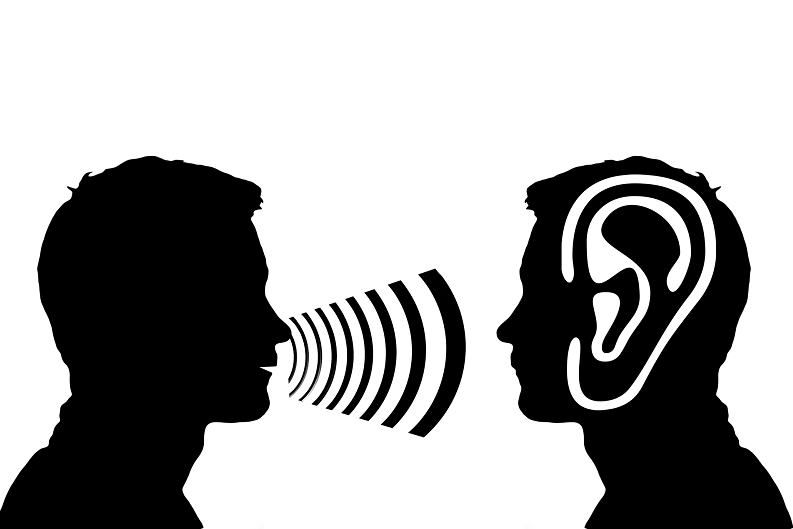On 3 March we celebrated World Hearing Day. It serves as a great opportunity to find out how you can support people with hearing loss.
Hearing disability makes it hard to function normally. People often are ashamed of it and try to conceal the fact that they couldn’t hear something. Little by little they become isolated from the rest of society, cultural events, scientific and professional activities. It doesn’t have to be that way!
We will suggest to you ways in which every member of the University of Silesia academic community can take part to improve accessibility for people with hearing disabilities.
Hearing problems affect more people than we think. The World Health Organisation states that we are dealing with a global hearing loss epidemic, which is mainly caused by an increase in noise coming from our surroundings and the progressive aging of our society. It is estimated that the number of people experiencing hearing problems will equal 2.5 billion by the year 2050. Hearing loss will affect one in four people, and every 14th person will have to use hearing aids or anchored hearing implants to function properly in their everyday life.
What do you need to know to effectively support people with hearing loss?
People with hearing loss can function in society in one of two ways: as Deaf people (written with a capital letter due to them considering themselves as a cultural and language minority) communicating with sign language, or as people hard of hearing – communicating in Polish but requiring some technological assistance. Most commonly, Deaf people are born with hearing loss and people who are hard of hearing lose their ability to hear at a certain stage in their life, therefore, they retain their language abilities. Selecting an appropriate form of support requires knowing the communication preferences of people with hearing disabilities.
How to support accessibility for Deaf people
If you are a university employee, keep in mind that a student communicating in sign language has the right to a sign language interpreter. Contact the Student Service Centre (in the University of Silesia Rectorate, ul. Bankowa 12) and ask about the availability of this type of service. For now, we are using external interpreters, they have to be booked with prior notice, but soon we will have interpreters available as part of the university administration.
When organising scientific and cultural events, booking a sign language interpreter is worth considering.
Did you know that..?
We have a Silent Choir operating at the University of Silesia? It is an immensely valuable initiative, which contributes positively to the fight against social exclusion of people who communicate exclusively with sign language.
Hard of hearing people at the University
Make up most of the people with hearing disabilities and chances are that you have already met them. They often hide the fact that they have difficulties hearing and that is why it is so hard to find them and to support them effectively. It is important to be attentive to the problems of people who may not be able to hear and discreetly support them in the process of communication.
- If you are providing administrative service for a student who is hard of hearing, make sure to speak slowly, loudly, and ask yes or no questions to verify if you have been understood. When dealing with a person who is hard of hearing, try to limit the noise coming from your immediate surroundings. It might be a good idea to move to an empty office, close the window, turn off the radio etc., to limit the unnecessary noise.
- If you are teaching or cooperating in research projects with people with hearing loss, be patient and attentive. Make sure that audio content is available also in a written form – notes, presentations, etc. Scientific conferences or seminars can provide live subtitles – then everything that is being said by the lecturer appears on the screen or mobile devices of people who request such support.
- Give hard of hearing people more time during oral exams or classes focused on discussing an issue and remember that hearing loss requires immense effort to understand verbal communication. Do not think that delay in giving you an answer is a sign of lower intelligence. It results from difficulties in hearing and processing verbal communication by the brain.
- Make sure that the audio equipment you are using is providing good quality sound – during remote classes, always have the microphone close to your mouth, during on-site classes use sound equipment and devices supporting transmission of sound (e.g. FM systems and induction loops). You can ask Anna Nawrot, Coordinator for Accessibility of the University of Silesia (e-mail: nawrot@us.edu.pl, nr tel. 32 359 1910) if such equipment is currently available.
- Add subtitles to the videos you are creating. The Digital Accessibility Act of 4 April 2019 requires it.
If you are interested in learning more about accessibility for hard of hearing people, we encourage you to watch lectures recorded as part of the social campaign “Aware University of Silesia. Openness”, which are available on our YouTube channel.
During the lecture “Accessibility for people who are hard of hearing” recorded on 1 March 2022, Lidia Smolarek Best speaks about the technologies useful for people who are hard of hearing.
You can also watch the lecture “Accessibility for deafblind people” delivered by Krzysztof Wostal on 22 February 2022, where he spoke about accessibility for people with simultaneous visual and hearing impairments.






